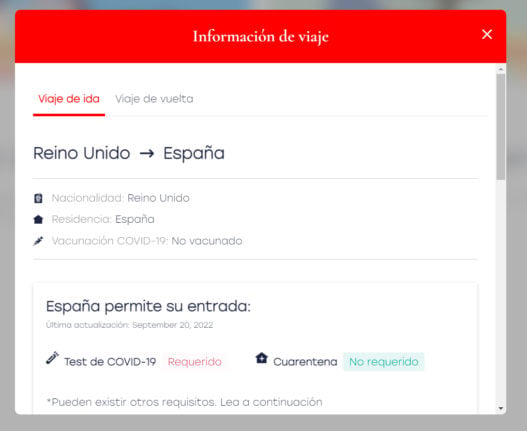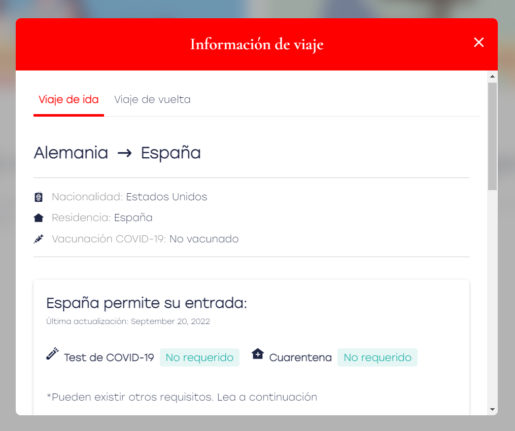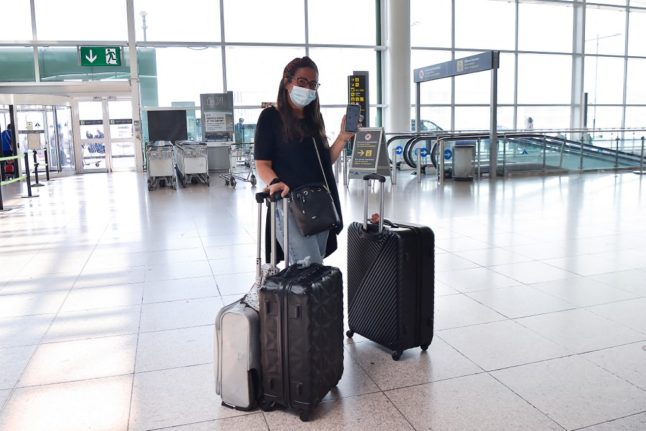The Covid-19 pandemic no longer dominates daily life or travel in Spain.
In recent days, the Spanish government has scrapped the Spth health control form for all travellers and soon it will stop carrying out temperature and visual checks on non-EU arrivals.
That’s not to say that all of Spain’s Covid-19 travel restrictions have been lifted. Non-EU tourists still need to show Covid-19 documents to be allowed into Spain, and on planes that are bound for Spain passengers must wear face masks.
But how about for foreign residents in Spain who are travelling back to the Spanish territory after a holiday abroad or a visit to their country of origin?
For example, would a UK or US national who legally resides in Spain and who has just spent a couple of weeks back in their country of origin need to show proof of vaccination, testing or recovery when they arrived back in Spain?
The question is not so much whether you’re a resident in Spain, but rather which country you’re travelling to Spain from.
If it’s a non-EU/Schengen country, then you technically have to show Covid documents. If you’re completely unvaccinated or more than 270 days have passed since your last Covid-19 vaccine, you’ll need to present proof of a negative PCR or antigen test. That’s irregardless of whether you’re a Spanish national or foreign resident in Spain.

If on the other hand you’re returning to Spain from another EU/Schengen country, then you will not have to show a Covid-19 certificate or equivalent document. Again, that’s irregardless of whether you’re a Spanish national, a resident of Spain (EU or non-EU national) or even a non-EU tourist who was already in the EU/Schengen Area before visiting Spain.

This is according to Spain’s travelsafe.spain.info website, where on its homepage section there is a section which allows you to choose “origin” (city/country you’re travelling from), your nationality and your vaccination status.
When you fill in the categories and click through, it tells you whether or not you need to get a Covid-19 test.
It also states your country of residence, even though you’re not given the option of filling this in (although, we reiterate, residence isn’t what counts).
Are Spanish airport officials still rigorously checking the Covid documents of arrivals from outside of the EU/Schengen Area? No.
Whether or not you get asked is up to chance. Some travellers have said they have been asked to show proof, whereas others have not.
“I went to the United Kingdom, vaccinated with the third dose more than 290 days ago (20 days over), so I needed a negative diagnostic test to return to Spain. I got a PCR in London, it cost me €80, and in Barcelona I didn’t even get asked for it”, one Spanish national wrote on Twitter.
Pues resulta que voy al Reino Unido, vacunada de la 3a dosis hace 290 dias (me paso 20 dias de lo permitido), por lo que necesito una prueba diagnostica negativa para volver a España. @sanidadgob @govern @aena (+)
— ari🦅 (@txcemtons) September 26, 2022
Keep in mind as well that if you’re travelling back to Spain from a non-EU country, but you have a layover in another EU/Schengen country first before reaching Spain, it will be that country’s rules that apply in terms having to show Covid-19 documents. You will already have entered the EU/Schengen Area before reaching your final destination (Spain), so you will not be asked to provide proof of Covid certificates when you land in Spain.
Is there a risk of being refused entry as a resident if you don’t have any Covid-19 documents upon arrival in Spain and you get asked to provide them?
The worst-case scenario is that you will be required to take a Covid test there and then at the airport. Spain has allowed legal Spanish residents (whether they’re EU or non-EU nationals) to return home to Spain even at the worst stages of the pandemic when travel was heavily restricted.
So, if you’re travelling back to Spain as a resident from a non-EU country, what Covid proof do you technically have to be able to show? Only one of the following:
- A Covid-19 vaccination certificate – Your vaccination status must meet the Spanish authorities’ validity period requirements. If more than 270 days have passed since your initial vaccination, you need to show proof of a booster shot.
- A negative Covid-19 test – This should be either a PCR taken within 72 hours prior to departure, or an antigen test, taken within 24 hours prior to departure.
- A recovery certificate – This must be dated within the last six months. You can use a medical certificate or recovery record to prove your Covid-19 status.
You can prove the above by showing a digital or paper certificate issued by the relevant authorities of the country in which you were vaccinated. If you were vaccinated in Spain, this can be Spain’s EU Digital COVID Certificate.



 Please whitelist us to continue reading.
Please whitelist us to continue reading.
Member comments